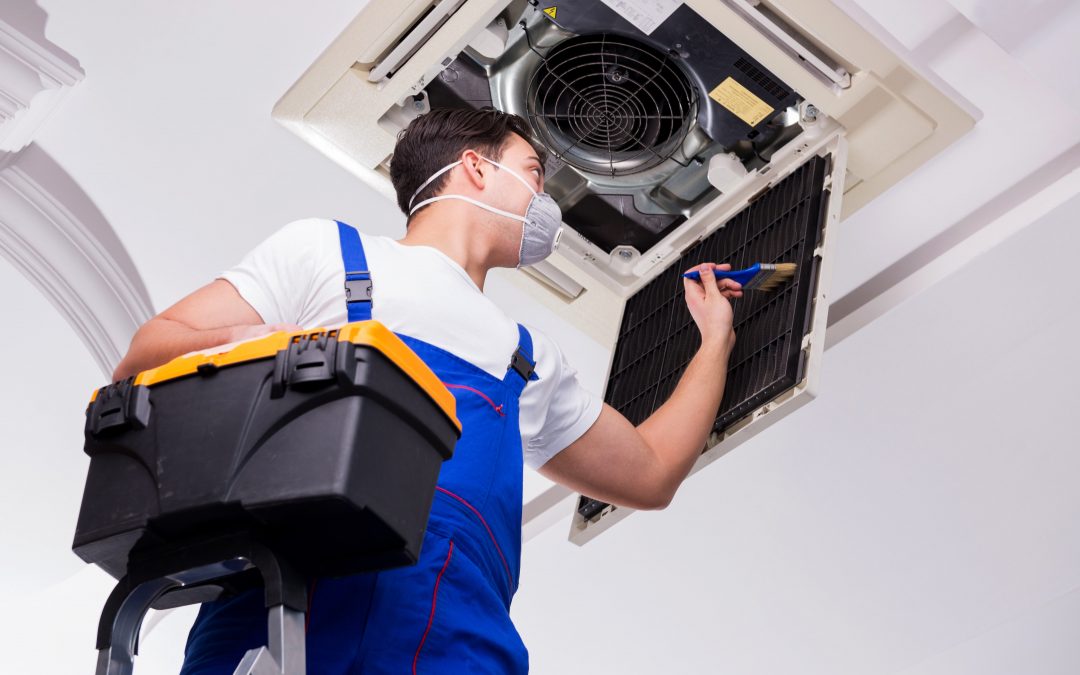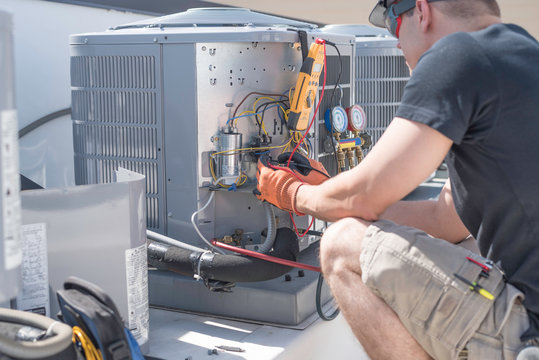The step-by-step process to ac unit replacement for homeowners
Everything about A/c: Identifying Common Issues and Effective AC Repair Work Approaches
Heating and cooling systems are vital for keeping indoor convenience. Recognizing their components and performance is essential for determining usual problems. Property owners typically encounter troubles such as inadequate cooling, unusual odors, or increasing energy costs. These indications can suggest underlying concerns that may call for interest. Exploring DIY troubleshooting methods can be advantageous, however recognizing when to seek specialist assistance is similarly crucial. What actions can be required to assure lasting performance?
Comprehending Your HVAC System: Components and Performance
A HVAC system, usually thought about the backbone of indoor environment control, consists of a number of key components that work with each other to manage temperature level and air quality. The primary elements consist of the home heating system, air flow system, and air conditioning unit. The heating system, usually a heating system or central heating boiler, generates warmth throughout cooler months, while the cooling device cools down indoor rooms during the summer.

Typical HVAC Problems Home Owners Encounter
Home owners usually encounter numerous common cooling and heating issues, including irregular temperature level distribution throughout their home. Additionally, uncommon sounds during operation can show underlying concerns that need interest. Attending to these problems quickly is necessary for keeping excellent system performance.
Inconsistent Temperature Circulation
Lots of households experience the frustrating concern of inconsistent temperature level distribution, where certain areas feel uncomfortably cozy while others continue to be as well cold. This trouble often arises from a variety of factors, consisting of poor insulation, obstructed vents, or an incorrectly sized a/c system. When ducts are not adequately secured or when furniture obstructs air movement, some spaces might receive inadequate cooling. Furthermore, thermostat positioning can significantly influence temperature regulation; a thermostat situated in a sunlit area may misstate the general temperature of your house. Regular upkeep, consisting of cleaning filters and making certain ductwork is clear, can assist ease these discrepancies. House owners might likewise think about zoning systems to far better control temperatures throughout different locations of the home, promoting a more comfortable living environment.
Uncommon Sounds During Operation
When a heating and cooling system runs, unusual noises can suggest underlying concerns that require interest. Home owners may come across a series of sounds, such as grinding, squealing, or hissing. Grinding noises commonly signify damaged bearings or parts, while squealing can recommend loosened belts or parts requiring lubrication. Hissing may show a cooling agent leak, which can jeopardize the system's performance. Additionally, banging audios might indicate loosened ductwork or a concern with the blower follower. Each of these sounds works as a caution, motivating house owners to explore better. Overlooking these signs can result in more considerable issues and expensive repair services. Normal upkeep and timely focus to unusual noises can boost system durability and efficiency, making certain a comfy living atmosphere.
Indicators That Indicate Your Air Conditioner Demands Fixing
Exactly how can one tell if their a/c unit needs repair? Several indications may indicate underlying issues calling for professional interest. Initially, if the AC stops working to cool the space effectively, it might recommend a refrigerant leakage or compressor malfunction. In addition, a rise in power expenses without corresponding usage modifications might signify inadequacy in the system. Property owners ought to additionally look out to unusual smells originating from the unit, which can show mold and mildew growth or electric problems. If the AC often cycles on and off, it might be a sign of a faulty thermostat or various other mechanical problems. Finally, the presence of water pooling around the device can indicate a clogged up drainpipe line. Identifying these indications early can save money and time, guaranteeing that the air conditioning system operates successfully and efficiently.
Do It Yourself Troubleshooting Techniques for HVAC Issues
When facing cooling and heating problems, property owners can use a number of DIY troubleshooting techniques to determine the trouble. Secret approaches consist of inspecting thermostat settings, checking air filters, and assessing drainage concerns. These actions can help determine usual breakdowns prior to looking for expert assistance.
Examining Thermostat Settings
What steps should property owners take to ensure their thermostat setups are appropriate? Initially, they should validate the thermostat is readied to the wanted temperature and mode, whether home heating or air conditioning. Inspecting for a clear display and confirming the thermostat is not established to "hold" or "getaway" setting is essential. Home owners should also validate that the thermostat is degree and set up in a place devoid of drafts, straight sunshine, or other temperature level affects. Additionally, altering the thermostat can aid offer accurate readings. If the thermostat operates on batteries, changing them might settle any concerns. By methodically evaluating these aspects, homeowners can often determine and correct thermostat-related issues, advertising excellent a/c system efficiency.
Inspecting Air Filters
Air filters play a vital duty in preserving excellent a/c efficiency. They trap dirt, irritants, and various other fragments, making sure tidy air blood circulation. With time, filters can end up being blocked, lowering airflow and efficiency. To inspect air filters, individuals should initially locate the filter, frequently found in the return air duct or near the furnace. When located, they should examine furnace replacement the filter's condition-- if it appears dirty or stained, it most likely requirements replacement. Many filters require transforming every 1-3 months, depending on use and ecological factors. Normal examination and prompt replacement of air filters not only boost air high quality however additionally lengthen the lifespan of HVAC systems, stopping possible breakdowns and pricey repairs.
Examining Water Drainage Issues
Just how can house owners successfully determine and address drain issues within their a/c systems? Initially, they need to check the condensate drainpipe line for obstructions or obstructions, which can lead to water buildup. Property owners might utilize a wet/dry vacuum to get rid of any particles obstructing the line. Next off, inspecting the drainpipe frying pan for rust or leaks is important, as a harmed frying pan can cause water to overflow. Regular cleansing of the drainpipe line with a blend of vinegar and water aids prevent future blockages. Furthermore, guaranteeing proper slope of the drain line advertises reliable water flow. If these DIY strategies do not fix the problem, speaking with an expert HVAC professional might be required to prevent potential water damages and system failure.
When to Call a Professional for AC Fixings

While some air conditioner concerns can be dealt with through do it yourself methods, there are circumstances where calling a professional becomes crucial. House owners need to seek professional aid when they run into relentless problems, such as inadequate air conditioning, weird noises, or uncommon odors originating from the device. These signs and symptoms might show deeper concerns that call for specialized knowledge and devices to diagnose and repair properly.

Preventative Maintenance Tips for HVAC Longevity
Normal preventative upkeep can considerably boost the longevity of a/c systems. House owners ought to schedule yearly inspections by qualified technicians to assess system effectiveness and identify potential concerns. Regularly changing or cleansing air filters is necessary, as this warranties appropriate airflow and minimizes strain on the system. Additionally, inspecting and sealing ductwork prevents energy loss and enhances total efficiency.
It is likewise a good idea to maintain the exterior unit clear of particles and plants, enabling peak airflow and warm exchange. Home owners should inspect the condensate drain for obstructions to prevent water damages and mold and mildew development. Moreover, maintaining appropriate thermostat settings and making use of programmable choices can enhance power performance. Documenting maintenance activities helps track service history and can assist in recognizing persisting issues. By adhering to these preventative actions, people can take full advantage of the effectiveness and life-span of their heating and cooling systems
Often Asked Questions
Exactly how Frequently Should I Replace My Heating And Cooling System Filters?
Heating and cooling system filters need to commonly be replaced each to 3 months, depending upon usage, filter kind, and ecological variables. Normal replacement aids preserve effectiveness and air quality, ensuring peak system efficiency throughout the year.
What Size Heating And Cooling System Do I Required for My Home?
To determine the appropriate HVAC system dimension for a home, one should think about square video footage, insulation quality, and neighborhood climate. Consulting a specialist can assist guarantee optimal performance and comfort for the particular living space.
Exist Eco-Friendly Cooling And Heating Options Available?
Yes, environment-friendly cooling and heating alternatives are available, including energy-efficient heatpump, solar-powered systems, and geothermal heating. These alternatives minimize energy intake and environmental effect, promoting sustainability while preserving efficient climate control for property and commercial rooms.
Just How Can I Boost My cooling and heating System's Energy Performance?
To boost heating and cooling energy performance, one can on a regular basis maintain the system, seal air leaks, set up programmable thermostats, use energy-efficient filters, and assurance appropriate insulation throughout the home to lower power consumption and improve efficiency.

What Is the Average Life-span of a HVAC System?
The average life-span of a HVAC system usually ranges from 15 to 25 years, depending on elements such as upkeep, use, and the quality of setup. Routine maintenance can significantly prolong its operational long life.
Verdict
In recap, a complete understanding of heating and cooling systems click here empowers property owners to determine usual concerns and address minor issues properly. Recognizing signs of breakdown, employing DIY fixing strategies, and focusing on routine maintenance can enhance system efficiency and efficiency. When faced with complex repair services, employing professional help is vital to guarantee security and durability. By cultivating awareness and aggressive care, individuals can appreciate a comfy interior setting while decreasing unforeseen prices related to HVAC failings.